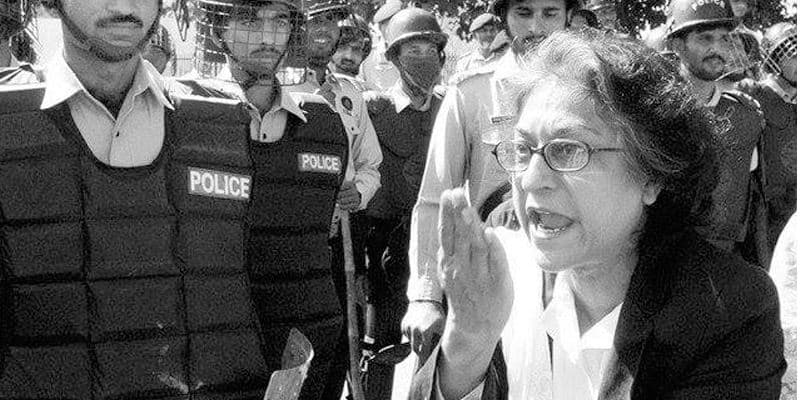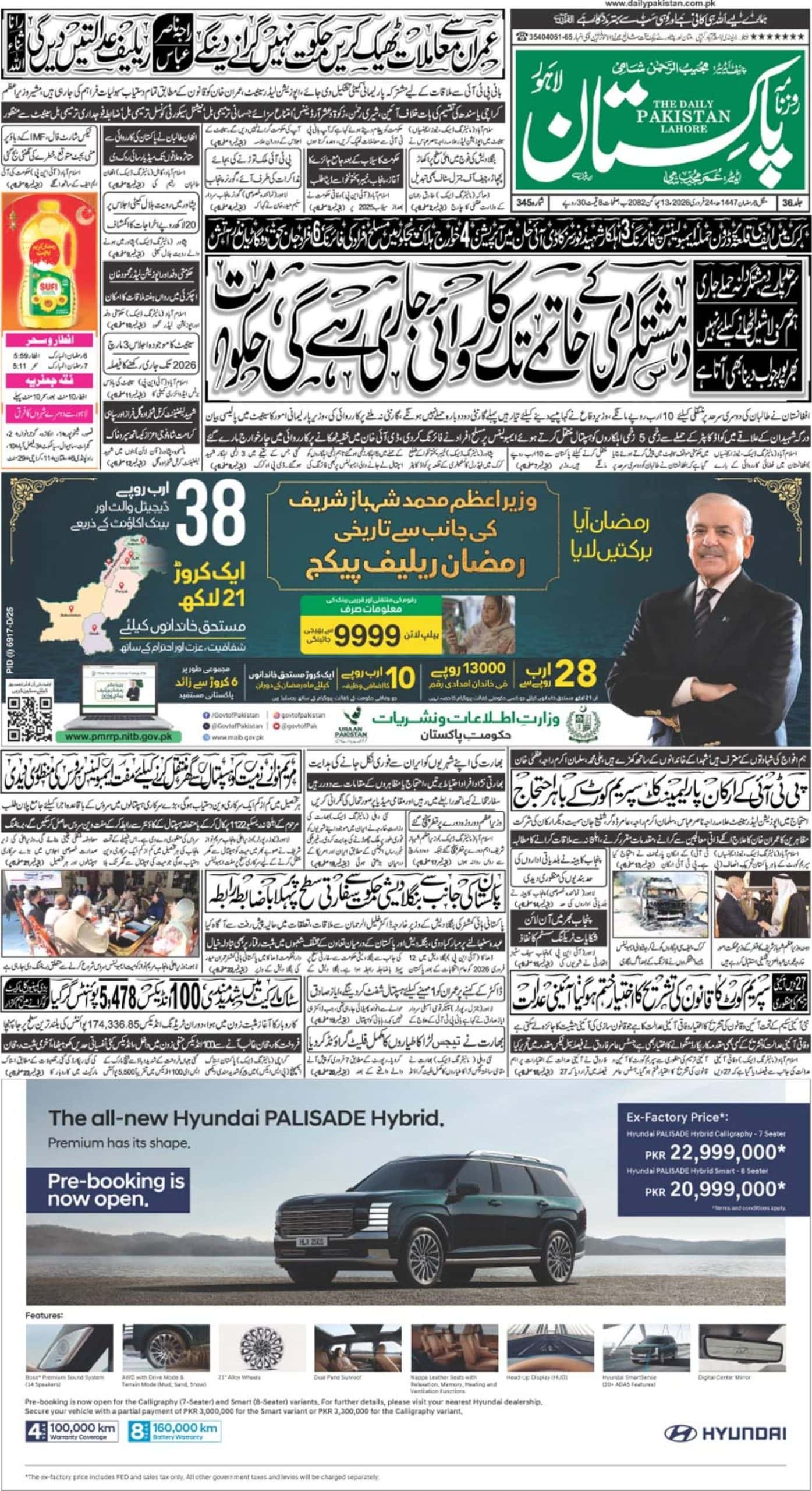When General Pervez Musharraf increased the quota of reserved seats for women by 17 percent in 2002, the media and civil society showered him with lavish accolades. Asma Jahangir was not so impressed, though. She told me, I will be happy when they appoint women in a similar ratio as corps commanders, admirals, and air marshals.” To her, it was a cosmetic move that did nothing against the status quo.
Unlike the so-called progressives who fell for Musharraf after his U-turn against Taliban, Asma Jahangir remained defiant. As much as she vehemently spoke for human rights of the Afghans, her contempt for military dictatorship never deteriorated.
Whoever interacted with her beyond the statements aired on TV and printed the newspapers will agree that Asma was a democrat to the core. Though she never liked to be questioned about her personal matter like religion, she privately called Islam as her identity. Distinctively, she strived for human rights and personal freedoms with utmost courage and optimism.
Like father like daughter!
Asma was brought up in Sahiwal and Lahore during the Ayub era as a teenager, and this formed her worldview. She witnessed the struggle of her father Malik Ghulam Jilani first as a public servant and then a left politician. Ayub eventually confiscated the family property and jailed Jilani in 1961. Later, opposition to the military operation in East Pakistan enraged Yahya Khan who jailed him again. A lesser-known fact is that he also opposed Islamabad’s recognition of Bangladesh. Later in 1972, Asma challenged her father’s arrest by then President Zulfiqar Ali Bhutto. He faced the worst incarceration, leaving haunting memories of disgusting torture. On the bright side, the court and jail visits to see her father led her to study law.

The path less trodden!
When her father was imprisoned for exercising his democratic right of dissent, his daughter led a large rally of women to the Punjab Governor’s House. She climbed the gate and attempted to hoist a black flag in 1969. She was arrested and suspended from college. Undeterred, Asma Jahangir (when was then 18 years old) moved the Supreme Court challenging Jilani’s detention. The proceedings were slow but the landmark judgment she won came in 1972. Though Yahya was neither the martial law dictator at the time, nor was he alive, the SC set a precedent by stating him a usurper and terming Jilani’s arrest illegal. No day goes by when a lawyer or judge cites the case law of Asma Jilani vs Federation of Pakistan 1971. Come 1974, she fell in love with Tahir Jahangir and both got married. Then on, Asma studied law privately through a class fellow. By 1980, she was a practicing lawyer along with her sister Hina Jilani. She inspired another first for Pakistan by setting up Pakistan’s first all-female law firm – the name AGHS comprised first initials of its founders – which offered free legal assistance to deserving clients. Ziaul Haq’s martial law and the promulgation of the Hudood Ordinance provided the right kind fuel to her activism. Asma, now a high court lawyer, was imprisoned for about a month in 1983 for exercising the right to the assembly which was suspended under the military law.
The political space had slightly widened with the arrival of Benazir Bhutto in 1985. The civil liberties were still not granted as per the constitution. In 1986, Asma Jahangir co-founded Human Rights Commission of Pakistan. Though the rights body denounced any foreign institutional financial aid secure its autonomy and neutrality, the opponents found it a soft target.The commission went on to become Pakistan’s globally reputed human rights watchdog.
Speaking to the European Parliament in 2008, she said: “I do not accept the fact that universal values of human rights can be and should be subservient to either social or religious norms.”
Her short-term jail gave her interesting insight and allowed her to develop useful contacts with ‘victims’ of Hudood law. Asma took up their cases, the most famous being of a raped blind woman who was arrested on charges of adultery (Zina). Under the Hudood law, the onus of proving rape lay on the complainant, failing which could lead to charges of adultery. Asma managed to win respectable release for the woman.
She set up Dastak, a special home for female victims of abuse, which offered them legal support besides a safe roof over their heads. In Asma’s own words, “Justice is a rare commodity in our part of the world, very rare! Sometimes even shouting for justice gives you some satisfaction that you’re being heard. And you must be heard. You knock, and you knock, and you knock, and you knock, and you knock, and one day they are going to hear.”
Only Asma had the courage to challenge the death sentence of Salaam Masih (11) and his uncle Rehmat Masih, who were accused by a Lahore vigilante mob of writing blasphemous words on a mosque wall in 1993. Manzoor Masih, another blasphemy accused, was murdered outside district courts premises in Gujranwala. Unfazed by intimidations and verbal and violent attacks, Asma argued in the Lahore High Court, as a result of which Salamat and Rehmat were acquitted on February 23, 1995. Justice Arif Iqbal Bhatti, one of the judges on the panel, was killed in 1997 for favoring acquittals in the blasphemy case. She never considered seeking asylum abroad.
On many occasions, Asma survived violent attacks which could have been exploited by any fame-hungry lawyer or politician as assassination attempts. She continued speaking for the voiceless in the courtrooms.

Speaking at the Right Livelihood Award in 2014, Asma Jahangir said, “Often I have been asked if I had any plans of leaving Pakistan because of numerous threats. Without any hesitation, I have replied negatively, because, in comparison to the terror of some, the warmth I have received from others is overwhelming.”
Those boundless controversies
The judicial movement against Pervez Musharraf’s sacking of Supreme Court will remain a key benchmark of the bar’s activism. Aitzaz Ahsan, Ali Kurd, and Hamid Khan were on the forefront with Justice Iftikhar Chaudhry. Asma Jahangir was not on the forefront. Though she was bitterly opposed to Musharraf’s rule, Asma might be amongst the first few to condemn sacking of the Chief Justice and later the other judges of the Supreme Court. Experience had taught her to watch her step. She stood by the principle but hesitated to back the personalities. The media-men like myself and young lawyers who shadowed Aitezaz Ahsan and Iftikhar Chaudhry from Khyber to Karachi by any means of transport and regardless of the weather, a decade later, realize her pragmatism was well-placed. The personalities and the movement both had serious limitations which hardly a few could foresee.
Though Aitzaz Ahsan promised to never to appear before Justice Iftikhar Chaudhary after his restoration , he did. The CJ himself proved that justice was not blind. Even though Asma was vindicated, she never taunted those who had criticized her judgment back in the day.
In 2008, Asma Jahangir visited India as Special Rapporteur on Religious Freedom. She traveled from the occupied Jammu and Kashmir to the Mumbai and Gujrat for fieldwork and interviews. What made headlines was Asma’s meeting with Shiv Sena leader Bal Thackeray. The print and electronic media went ballistic, but never reported her scathing comments about Shiv Sena and other Hindu extremists in the report submitted to the UN Secretary-General.

The Kashmiri leadership on both sides of the Line of Control was perturbed that Asma’s report equated Indian atrocities with certain violation of right committed by the freedom fighters. Her blunt stance on Burhan Wani martyrdom cleared the dust. Asma reminded so-called liberals and progressives about the forgotten cause of Jammu and Kashmir.
Muttahida Qaumi Movement never appreciated Asma Jahangir for her stance on the human rights situation in urban Sindh until the Lahore High Court ordered the Pakistan Electronic Media Regulatory Authority (Pemra) to black out Altaf Hussain’s speeches in 2015. She took it upon herself to defend in the court Altaf’s right to expression. She also defended Hussain Haqqani, now a self-exiled Pakistan whom Zardari appointed the ambassador in Washington, in the Memogate case.
It’s no secret that Jamaat-i-Islami and Asma Jahangir have remained poles apart on Zia’s Islamization drive as well as Pakistan’s socio-cultural outlook. Yet, Asma Jahangir stepped up to condemn Qazi Hussain Ahmad’s arrest in 2002.
She led HRCP mission to register human rights violations in Baluchistan, a study that could help the establishment understand the nature of grievances and impact of its hard-nosed actions.
Asma Jahangir has been the longest-serving United Nations Special Rapporteur on human rights. She was currently UN’s point person for Iran, which allowed her to visit the country to conduct interviews and research. One of the cases she was pleading before the Lahore High Court was of Turkish families of Pak-Turk School staff who are facing Tayyip Erdogan’s wrath.
Quite accustomed to criticism, Asma knew that the self-righteous types brand her Illuminati, Qadiani and a foreign agent. She would laugh at such insinuations.
Allergic to populism and the establishment both, Asma never spared politicians and political parties for their failings. William Dalrymple quotes Asma Jahangir in The New Yorker, “If Pakistan’s dictators are sometimes less dictatorial than one might imagine, then its democrats have proved consistently less democratic than they should be.” She was never tempted to accept a political office with executive powers. Asma turned down the offer for the caretaker prime minister in 2013. The only election she contested was of Supreme Court Bar Association which she served as elected president for one term.
Asma was often projected as an angry lady. Though there was so much rage stored in her against the unjust statecraft, she was a very calm human being to converse with. As a former court correspondent, I have had asked many dumb questions on a number of times, often based on hearsay. She never snubbed me rudely. Asma had perfected the art of explaining the most difficult legal issues in the simplest form of Urdu or English language. She was candid and animated. Her wit was sharp, helping her speak less to express more.
Asma Jahangir was a true Pakistani who lived the life of a staunch optimist. Her struggle was inspired by hope. Honorary doctorates and coveted awards could not distract her from the real mission she chose to fulfill. Even so, she leaves behind a rich legacy of human rights activists, lawyers, and journalists, Asma Jahangir’s shoes will remain empty. Rest in peace!














